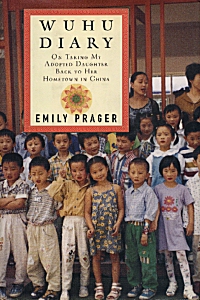
Wuhu Diary:
On Taking My Adopted Daughter Back to Her Hometown in China
by Emily Prager
Random House, 2001
Reviewed by Barbara Free
The author spent a good deal of her own childhood in Taiwan with her father after her parents divorced, so had not only a personal connection to Chinese culture, but a very personal life experience of being separated from her birth mother. The combination gave her a deeper understanding of what her little daughter might be experiencing as a child growing up out of her native element and without her biological mother. She had already had her enrolled in a Chinese-language preschool in New York, and was in touch with others who had adopted Chinese daughters. She had read numerous books on raising adopted children, on raising children of a different race and culture, but still felt something was missing. She knew it would not be possible to find LuLu’s birth mother, that it would be dangerous for the woman if she did, but she did hope to visit the orphanage where she got LuLu, and more important, give LuLu the chance to really know her culture, her people, her native city.
By plane and by train, they journeyed to Wuhu, stopping first in Shanghai for a few days. Along the way, she debated to herself about how much to tell LuLu about the circumstances of her birth and adoption. LuLu, a very bright and inquisitive little girl, is already aware that her mother is not Chinese and that LuLu is. Emily explains to her that she was born in Wuhu to Chinese parents, who were unable to keep her. She does not want to tell her the cultural, economic, and political issues that impact Chinese female babies. How could a mother tell a beautiful little girl that she was not valued in her own homeland, just because she is female?
Arriving in Wuhu, they set up residence in a hotel for the months they were there. The original plan was to stay several months. However, it turned out to be more costly than the author had anticipated, and she decided she needed to return to New York sooner in order to get back to work. Also, during their stay, the Chinese Embassy in Belgrade was accidentally bombed by U.S. troops, and, as the only U.S. woman in Wuhu, she became uncomfortable with the news being given out in China that the bombing was not accidental at all. While there, however, she enrolled LuLu in a preschool there, and got to know the hotel personnel quite well. LuLu became fluent in Chinese and intimately acquainted with the various people working at the hotel.
Ms. Prager tries repeatedly to visit the orphanage, which has moved, but runs into many obstacles. The local officials seem to be very much afraid of her finding out too much. People offer to help her and then back off. In the meantime, LuLu is embracing her Chinese identity. At one point in her journal, the author says, “As LuLu becomes more accepted and involved with the young people here, in school and at the hotel, she is, in fact, moving over to them. I see her sometimes look back at me, surreptitiously, over her shoulder, wondering who I really am to her and what it means to have me, the Caucasian foreigner, as her mother.”
LuLu celebrates her fifth birthday in Wuhu, shortly before they leave. After their return to New York, friends comment that she seems much calmer, happier, somehow more grounded, than she did before. Her mother says, “She has reclaimed some part of herself.”
This was a book that was difficult to put down, and several others who borrowed it also found it fascinating. It would be an important book for adoptive parents of any child, but particularly so for those who have adopted Chinese daughters. The author is loving, straightforward in her approach, and wonderfully affirming of her daughter.
Excerpted from the July 2002 edition of the Operation Identity Newsletter
© 2002 Operation Identity